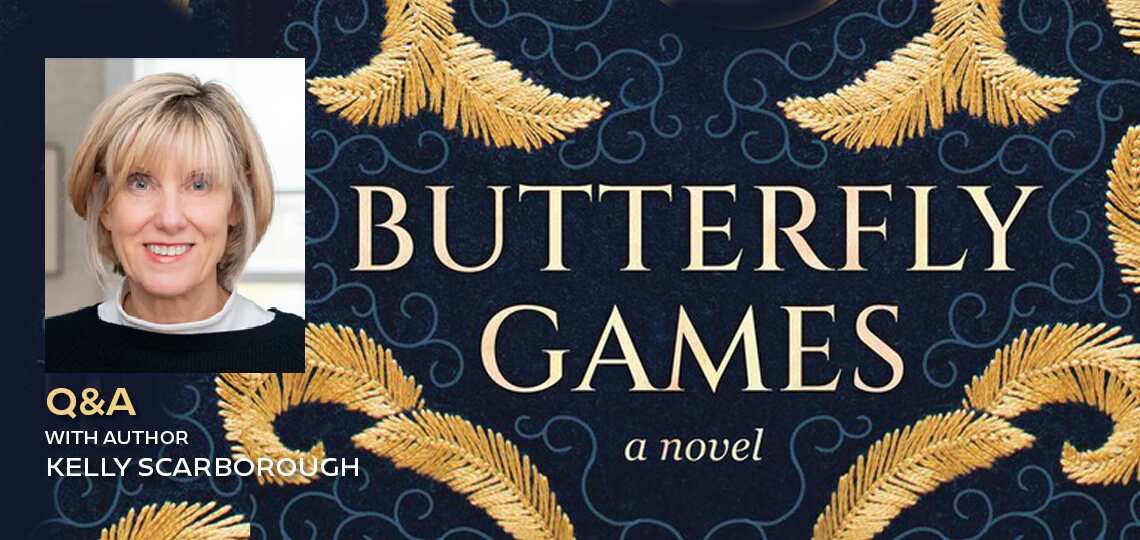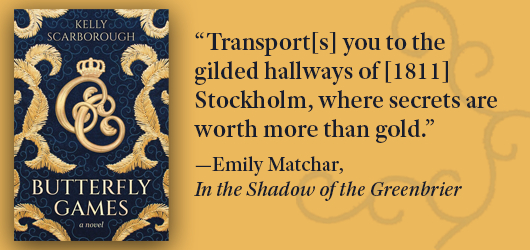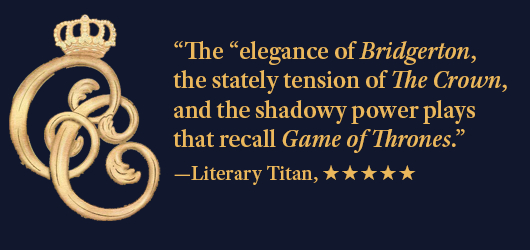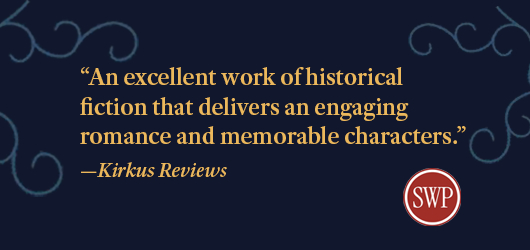Butterfly Games: Where Winning Means Losing Everything that Matters

Executive Editor Matt Sutherland Interviews Kelly Scarborough, Author of Butterfly Games
The late eighteenth and early nineteenth centuries certainly rank as one of history’s most compelling time periods. With the New Worlds of the Americas and Australia coming into their own, Napoleon antagonizing capital cities across Europe, the Industrial Revolution energizing market economies from Chicago to Paris to Calcutta, and populations exploding across the globe, it’s difficult to keep track of all the extraordinary people, places, and events.
Kelly Scarborough found her historical muse in a beautiful young countess named Jacquette Gyldenstolpe who unwittingly makes a splash in the Swedish royal court by falling for the heir to the throne, Prince Oscar. Rest assured, this is anything but a story of unrequited love. Welcome to the Butterfly Game, Jacquette.
Smitten with this fantastic tale of royalty, intrigue, and forbidden passion, Foreword’s Matt Sutherland reached out to Kelly for a lively conversation.
You transport us to the Swedish royal court in the early 1800s, a time when Napoleon is the all-consuming figure in European politics, and one of his generals is the acting crown prince of that Scandinavian nation. Jacquette, your protagonist, is a teenaged countess, new to court and not at all thrilled to be there—until she falls in love with Prince Oscar, an heir to the throne. Can you tell us what drew you to this place, at this time in history, to write your debut novel?
Like so many of the interesting things in my life, the idea for Butterfly Games was born while I was reading. One of my earliest loves in historical fiction was a 1951 novel called Désirée by Annemarie Selinko, which I found on my mother’s shelf. The tattered book introduced me to Oscar’s mother, Désirée Clary, a silk merchant’s daughter from Marseilles, who was once engaged to Napoleon and later became queen of Sweden. I must have read that novel half a dozen times as a teenager, fascinated by her unexpected and deeply human story.
Years later, thoughts of that novel came back to me at a difficult time, and I began dreaming about the world of Butterfly Games. I started researching Désirée’s descendants—the Bernadotte dynasty, which, incredibly, still reigns in Sweden today. I uncovered a treasure trove of political intrigue and heartbreak.
That’s when I stumbled across Jacquette, a Swedish countess with a life so compelling I couldn’t look away. She met Désirée’s son Oscar only months after he arrived from France, when he had just become Swedish royalty. Both vulnerable, the two fell in love, and some believe that their bond threatened the new dynasty.
At that moment, I knew. Jacquette’s story was the one I had to write.
Let’s talk about the harmless-sounding title, Butterfly Games. Ominously, more than once in the book, Jacquette is warned by a sympathetic aunt that the “Butterfly Game is not for the halfhearted.” And Jacquette admits to never mastering it. What is the game and why did it draw you in?
In the novel, the Butterfly Game is a kind of shorthand for the unspoken rules of life at the Swedish royal court—a glittering but claustrophobic society of maybe fifty families, both royal and noble, who lived by their own code of social, sexual, and political maneuvering.
At first, Jacquette is a bullied teenager, but over time she learns to play, even influencing Charles Jean, a legendary strongman. I was fascinated by how women carved out power in systems designed to silence them by forming gossip networks, alliances, and relationships.
It wasn’t the kind of power men wielded on battlefields or in parliaments, but it mattered.
The novel’s title came to me while translating a passage from Queen Hedvig Elisabeth Charlotta’s nine-volume diary. An annotation used the Swedish word fjärilsleken—“the butterfly game”—to describe her husband’s philandering at court. That caught my imagination, and I gave the term a slightly more sinister, political cast for the novel.
You have great fun, it seems, writing scenes involving the Chatterati, the gossipy young maids of honor of the court—who are, it should be mentioned, outranked by baronesses and the chief court mistress and members of the royal family. Of course, beauty plays a prominent role in the court as well. In any case, these gossipy, petty, and cruel young women play a prominent role in the book. Where did the word “chatterati” come from and what is it about that part of royalty that appealed to you?
Would you believe the name “Chatterati” started with The Rolling Stones? I’ve been a fan forever—I’ve probably seen them twenty five or thirty times in five countries—and my shelves are full of Stones books alongside my Sweden research (my husband is very tolerant).
While working on later drafts of Butterfly Games, I was re-reading Robert Greenfield’s chronicle of the Stones’ 1972 US tour, the moment when the “glitterati”—Andy Warhol, Truman Capote, Lee Radziwill—swept into their world. Around the same time, I was rewriting my novel’s first chapter, trying to capture Jacquette’s voice amid the gossip about her mother’s scandalous divorce. In the thesaurus, I chose “chatter,” married it to “glitterati,” and the Chatterati were born.
I later discovered the term already existed. Merriam-Webster defines it as a disparaging term for “the chattering classes.” But for my gossipy maids of honor, it was perfect.
The book delves into extraordinary detail about governmental policy, in addition to political machinations. For example, we are privy to negotiations between the Leader of the Nobles and Speaker of the Peasants about wolf attacks. There’s also ample discussion between Jacquette and Oscar about Withdrawal Power policy: an attempt by the crown prince to stifle public dissent. Where did your research take you to discover this part of Swedish history?
Stockholm’s Royal Library is always one of my first stops in Sweden. It holds every newspaper published in Sweden for centuries, now online. I also own memoirs by members of the Riksdag, Sweden’s parliamentary body at the time. Though written by men, the observations on life and politics are fascinating.
In researching Butterfly Games, I studied Sweden’s history of press freedom. Sweden was the first country to make this guarantee, in 1766. Charles Jean, soon after he arrived in Sweden in 1810, enacted the Withdrawal Power, which allowed him to censor any publication deemed threatening. Jacquette’s stepfather, Wetterstedt, enforced it as Chancellor of the Court, though some of his closest friends were writers. In that sense, he reminded me of a gentler Thomas Cromwell.
The Withdrawal Power was abolished in 1844 by Oscar, in one of his first acts as king. I’d like to think that Jacquette may have influenced him.
You also take great care in highlighting the clothing being worn by the royals and court figures. Is this an interest of yours? How did you manage to find such detail about fabrics, designs, and fashion in early nineteenth century Stockholm?
Fashion led to one of my most incredible research experiences. On a private tour of Löfstad Castle, once home to Jacquette’s Aunt Emilie, I was shown one of Emilie’s Empire-style gowns. In the drawer below was Axel von Fersen’s embroidered silk court jacket. Those garments really brought the story to life for me.
I also translated letters between Jacquette, her Aunt Emilie, and her mother, Aurora, which sometimes discussed and contained sketches of clothing. More broadly, I studied portraits, early women’s magazines, and online museum archives, like those of the Met and the V&A.
Fashion was more than just appearance, then as it is today.
Divorce was fairly common among royal couples but one of the many downsides of being a woman was that husbands would decide the fate of their children, and girls were not prioritized, as happened to Jacquette. “Boys mattered, and men made the decisions,” Jacquette realizes early in life. The disheartening reality is that women didn’t possess much power. How, as a lawyer and former prosecutor, did you balance your feminist leanings with your desire to offer an accurate account?
When writing about historical women, it’s tempting to give them modern feminist sensibilities. But Jacquette lived in a world without photography, without trains, and certainly without our ideas of equality. What inspired me was how women still managed to subvert the rules stacked against them.
Some of Jacquette’s role models did this brilliantly. Queen Charlotte organized a boycott of court functions to protest the actions of her brother-in-law, King Gustav III. Jacquette’s mother, Aurora, wielded influence through her second husband, Wetterstedt, who became chancellor and later foreign minister. These women didn’t have the same power men did, but with courage and intelligence, they bent the system to their advantage. That resilience is what I wanted to honor.
Jacquette’s mother, Aurora, an A-level player of butterfly games, is shrewd, pragmatic, and also somewhat lacking in the maternal qualities that Jacquette seeks from her. But the times require a great deal of scheming and strategy to get ahead in high society. At one point, when Jacquette is frustrated and threatening to break off ties with Oscar, she cautions herself, “When people break rules, as Aurora always says, fortunes disappear, monarchies fall, lives are lost.” Can you help us understand the delicate dance so many in the periphery of royalty must know the steps to?
Aurora truly lived by those words. Jacquette, though, has a different temperament. She resists acknowledging the game she’s caught in, and that resistance becomes her growth arc—learning to see the delicate dance for what it is, even if she never fully masters it.
That tension reminded me of Princess Diana. Like Diana, Jacquette was born into a storied aristocratic family but grew up somewhat removed from court life. Both had childhoods shaped by scandalous divorces, and both, against the odds, fell in love with heirs to the throne. Their refusal to play by the rules set by privilege brought them both power and tragedy.
In Butterfly Games, legislation was passed to require that Royal Highness Charles Jean’s heirs descend from royal blood, so it’s crucial that his son, Oscar, make a wise decision about who to marry. Such was the reality of that time. But even as royalty, kings, queens, and monarchies feel so antiquated today, there is still a craving for autocratic rulers in certain circles of society. What is it about the strong-armed, “God-chosen” heads of state that attract so many would-be subjects?
As Americans, with our relatively short history, it can be hard to understand the enduring fascination with royalty, and harder still to justify the entitlements that go along with it. But royal stories are a bridge to history. Visiting Versailles or Hampton Court means more when you know about the women who lived there and what they faced. Historical fiction can be a wonderful entrée to new places. People crave stories about the past and present occupants of these magical castles, and maybe that feeds the fascination.
Without mentioning the R genre, we absolutely must call Butterfly Games a love story, one with racy sex scenes, jealousy, ambition, and all the rest—wrapped in a meticulously written historical fiction package. And in a telling sentence that may hint at your future writing plans, Q’s last scene with Oscar before she marries for strategic reasons leaves us with these parting words: “Q, do what you must, but don’t think this is the end.” Okay, let’s use the R word: how romantic. Without a doubt, you have written a wonderful love story. From the get-go in your writing and research for the book, was the love-story aspect your intention? What’s next for you and your talented pen? Might a series be in the works? Can you share?
Oscar does so want to be good, doesn’t he? But, in R-genre terms, he’s just a rake struggling to reform. He fails, but he keeps trying—and readers will see that in book 2 of the Butterfly Games series, where Jacquette and Oscar take their relationship to its next phase.
Matt Sutherland



